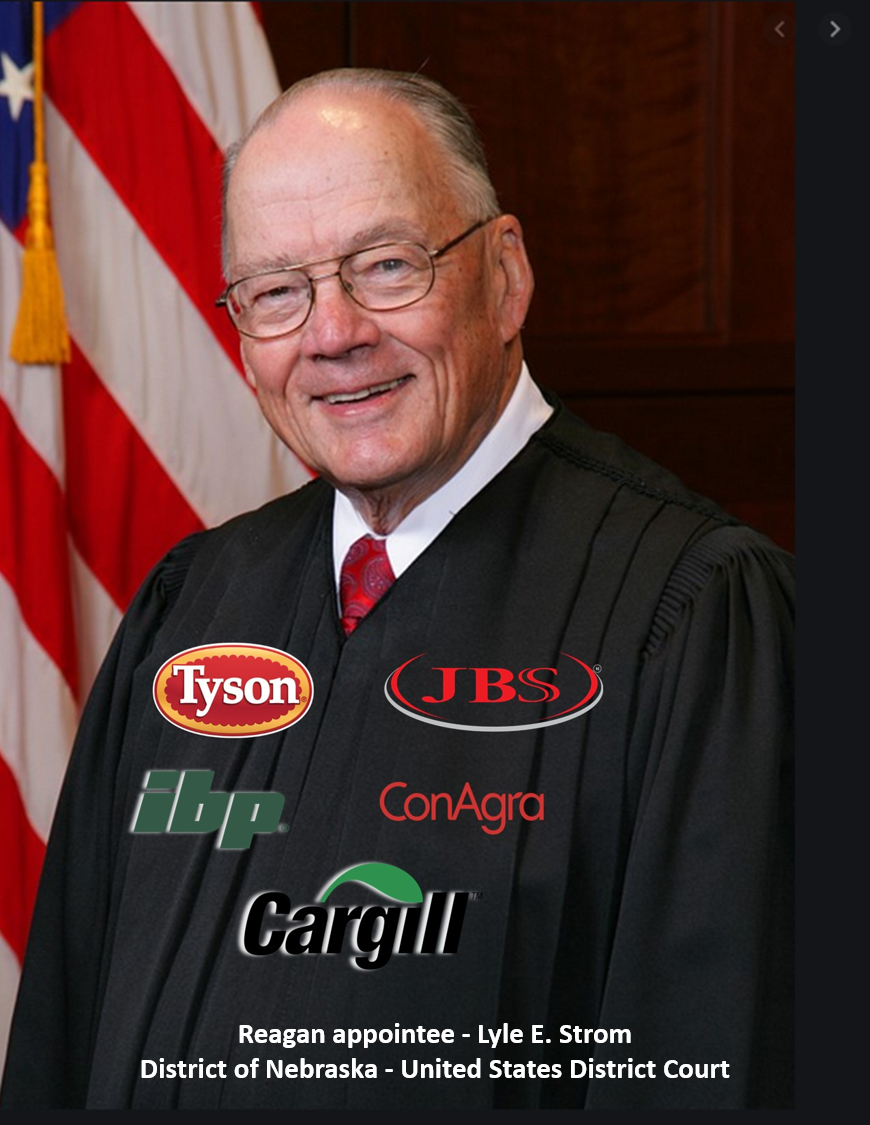President Ronald Reagan appointed pro-corporate, de-reg, no-rules judges to our nation’s highest courts. Has President Trump done the same?

“He’s in Tyson’s pocket, He’s in Tyson’s pocket!” said New Mexico rancher, Sam Britt, during the opening days of the 2004 cattlemen’s trial for fair markets. It was considered the most important case relative to the cattle business since 1921. I argued that what appeared to be the judge’s apparent preference for Tyson was actually the judge’s effort to make the case stronger, better for standing up to an appeal. Sam was right. I was wrong!
“History shows that it is just as effective to legislate from the bench by striking down laws as by upholding them.”
Judge Strom went on to seriously cripple the Packers and Stockyards Act with his decision in the precedent-setting Pickett vs. IBP/Tyson case. Congress broke up a less powerful meatpacker monopoly in 1920 with a consent decree, and to protect producers from future concentrated and abusive power, passed the Packers and Stockyards Act in 1921. Other antitrust laws like the Sherman and Clayton Acts were already in place protecting consumers from abusive market power. The jury found in favor of the cattlemen. Judge Strom quickly reversed their verdict, taking away the $1.28 billion award and any hope of the injunctive relief that would have forced the big meatpackers back into a competitive marketplace. Judge Strom’s reversal of the jury verdict ignored the clear and plain wording of the Act and the Congressional intent to protect producers of livestock from any future meatpacker monopoly. On that Spring day in 2004, Judge Strom essentially tossed the entire cattle industry into the big meatpackers’ meat grinder, where fewer and fewer of us remain today.
The Pickett/IBP/Tyson case eventually worked its way up to the Supreme Court, where the Robert’s led pro-corporate court refused to hear it, giving the big meatpackers the green light to confidently continue their pillaging and plundering of our cattle industry.
Around the same time, Judge Strom dismissed a shareholder case against ConAgra for cooking the company’s books. ConAgra was one of the biggest and considered one of the most corrupt corporations in the country. The ConAgra case could have been equivalent to the Enron case. ConAgra was one of the big four meatpackers at the time, later to become Swift, and eventually JBS, the biggest, and without question, the most corrupt and criminal meat company in the world.
Judge Strom is now retired. What does the future of our courts look like? Is there a chance the courts may once again represent the people’s interests?
Oct. 12, 2020
For almost 50 years, the multibillionaire has been pushing for a court unfriendly to regulation of the market. He may be on the brink of victory.
By
Christopher Leonard is the author of “Kochland.”
“Charles Koch has activated his political network to support Judge Amy Coney Barrett’s nomination, and to tip the scales on her nomination battle in the U.S. Senate. While much of the commentary about Judge Barrett’s nomination has focused on the real prospect that Roe v. Wade may be undermined or overturned, Mr. Koch has other concerns. Judge Barrett’s nomination is the latest battleground in his decades-long war to reshape American society in a way that ensures that corporations can operate with untrammeled freedom. It may be a pivotal one.
“And shaping the U.S. judiciary has been part of Mr. Koch’s strategy from the beginning. In that 1974 speech, he recommended a strategy of “strategically planned litigation” to test the regulatory authority of government agencies. Such lawsuits could make their way to the Supreme Court, where justices could set precedent. In the 1990s, he focused on lower-level judges, funding a legal institute that paid for judges to attend junkets at a Utah ski resort and Florida beachfront properties; the judges attended seminars on the importance of market forces in society and were warned against consideration of “junk science” — like specific methods to measure the effects of pollution — that plaintiffs used to prove corporate malfeasance.
“Mr. Koch also sought to influence the judiciary at the federal level. Between 1997 and 2017, the Koch brothers gave more than $6 million to the Federalist Society, a nonprofit institute that recruits libertarian and conservative judges for the federal judiciary, according to a tally by the activist group Greenpeace.
“History shows that it is just as effective to legislate from the bench by striking down laws as by upholding them. The Lochner era proves that policy negation is just as powerful as creation, and it affects just as many lives. As Charles Koch has written and stated so often in the past five decades, there are many, many laws and programs that he would like to negate. With the nomination of Judge Barrett to the court, he appears to be closer than ever to achieving this goal.”

Associated Press
Who will Justice Amy Coney Barrett represent?












